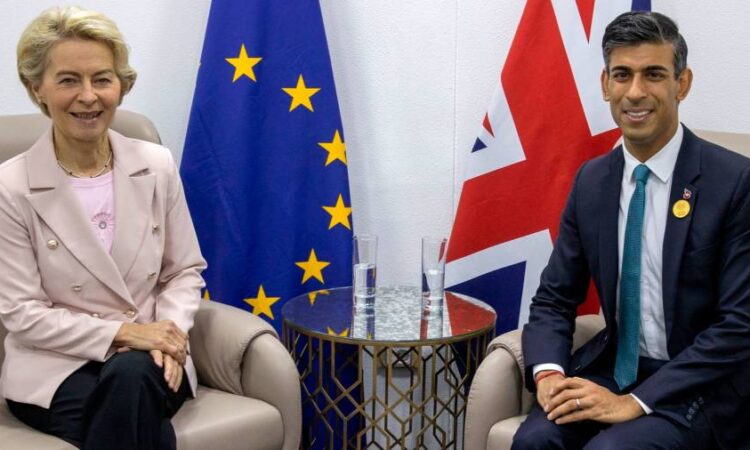
The European Commission president will travel to the UK on Monday in a bid to strike a deal overhauling Northern Ireland’s trading arrangements, as the two sides attempt to settle a bitter dispute that has overshadowed post-Brexit relations.
Ursula von der Leyen will meet UK prime minister Rishi Sunak to work towards “shared, practical solutions for the range of complex challenges” around the Northern Ireland protocol, said Brussels and Downing Street.
The meeting suggests the UK and the EU are finally ready to settle their differences over a stand-off that has persisted since the UK’s departure from EU single market and customs union in 2021.
The Northern Ireland protocol that sets out the region’s post-Brexit trading arrangements forms part of the withdrawal agreement that the UK and the EU finalised in 2019, when Boris Johnson was Britain’s prime minister.
“This is the closest we’ve been to putting the issues with the protocol to bed, which would allow us to move the relationship with the UK into a much more constructive framework,” said one EU diplomat on Sunday. “It seems the elements of the deal are clear.”
The proposed Brexit deal is designed not only to restore devolved government in Northern Ireland, but also to improve the UK’s relations with the EU and the US, where Joe Biden’s administration has expressed concerns.
Pro-British parties in Northern Ireland objected to how the protocol treats the region differently to the rest of the UK, while businesses complained about unnecessary bureaucracy.
Britain’s deputy prime minister Dominic Raab told Sky News on Sunday that negotiators were “in a position where we are close to, on the cusp of, a deal”.
But Sunak could face a showdown with some Eurosceptic Conservative MPs and the Democratic Unionist party, Northern Ireland’s largest unionist party, over the deal.
The DUP last year forced the collapse of Northern Ireland’s power-sharing government at Stormont in protest at how the protocol creates a de facto border in the Irish Sea because goods being shipped from Great Britain to Northern Ireland must undergo checks. This reflects how Northern Ireland remains part of the EU single market for goods in Johnson’s Brexit deal.
Sunak told the Sunday Times he was “giving it everything” to try to strike a deal with the EU on the Northern Ireland protocol. He added that he did not believe the deal would leave Northern Ireland in the “orbit” of Brussels.
The prime minister added he would try to resolve the concerns of the DUP, which objects to how the European Court of Justice has a role in overseeing implementation of the Northern Ireland protocol.
DUP leader Sir Jeffrey Donaldson has called for changes to the legally binding UK withdrawal agreement with the EU and has urged Sunak to get the right deal, even if that takes longer.
Raab confirmed the proposed Brexit deal was designed to cut checks on goods moving from Great Britain to Northern Ireland, and limit the role of the European Court of Justice.
A “green lane” with minimal checks would be set up at Irish Sea ports for goods going from Great Britain into Northern Ireland. A “red lane” involving substantive checks would be used for goods heading for the Irish Republic.
The deal is expected to reduce the influence of the European Court of Justice in Northern Ireland but keep it as the ultimate arbiter of disputes about EU law.
“If we can scale back some of the regulatory checks that apply and some of the paperwork that applies, that would in itself involve a significant, substantial scaling back of the role of the European Court of Justice,” said Raab.
Mark Francois, leader of the European Research Group of pro-Brexit Tory MPs, said cutting the influence of the European court was not enough.
He told Sky News the DUP could not accept a Brexit deal where EU law was superior to UK law in Northern Ireland.
“Unless that legal text when we see it expunges EU law from Northern Ireland it’s very unlikely that the DUP will support it . . . less of a role is not enough,” said Francois. “We have to get rid of EU law in Northern Ireland.”






